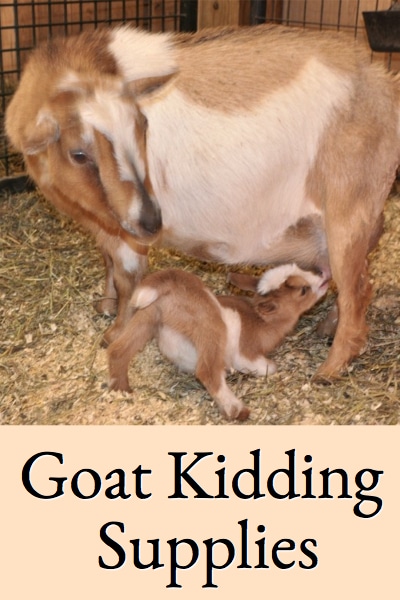
I try to have supplies on hand to handle all reasonable possibilities – one year I would have sworn that we wouldn’t need supplies to tube feed a kid. Guess what? We learned how to tube feed a kid in a hurry, and I was so happy that I’d prepared and gotten all those supplies. Dillinger (see photo below) wouldn’t have made it otherwise.
I want to make sure that we have everything we might need, that prescribed medications are not expired and anything that needs to be refilled or replaced has been taken care of. When the does are freshening is not the time to realize you don’t have something needed on hand or it’s no longer effective!
I always stress over this list – have we got all the goat kidding supplies that we might need? Each year there seems to be a new situation that requires immediate attention. For now, these are the things that we have on hand to support freshening does and newborn kids.
Goat Kidding Supplies
Vet’s phone number & cell phone – for emergencies or questions (make sure your vet will make an emergency farm visit too [or has arrangements with other vets for emergency off-hour coverage]). The goats seldom seem to have issues at convenient times.
Anti-bacterial soap – for washing prior to doing an internal exam or helping pull kids
Towels or puppy pads – to help dry the kids and keep them somewhat clean, we like puppy pads because they’re disposable
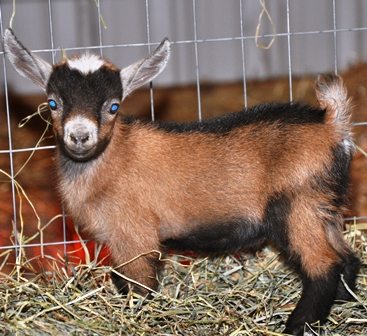
Bramblestone Dillinger (he had to be tube fed but he made it!)
Dental floss – for tying off the umbilical cord of newborn kids
Surgical scissors – disinfected, for cutting the excess umbilical cord after being tied off
7% Iodine – for dipping the tied-off umbilical cords
Disposable OB gloves (nylon or latex) – for an internal exam, delivery help, handling of the placenta
Lubricant (KY liquid, J Lube, mineral oil) – for lubricating gloves prior to an internal exam
Clean bucket and hot water – for clean udders and hands after an internal exam
Kid puller, leg snare – to help deliver, keep head straight during birth
Collar and lead – for tying doe if needed to assist during birth or kid nursing
Thermometer – to check whether kids or does are normal
Supplies for Does/Ailments
Fresh warm water/grain – does are often very thirsty and hungry (need energy) after kidding but it’s best to watch or remove water buckets during kidding so babies don’t drown. The does really appreciate warm water after kidding and I’ve seen some drink a whole bucket
Penicillin (Procaine G) – to treat illness, difficult birth, retained placenta, etc.
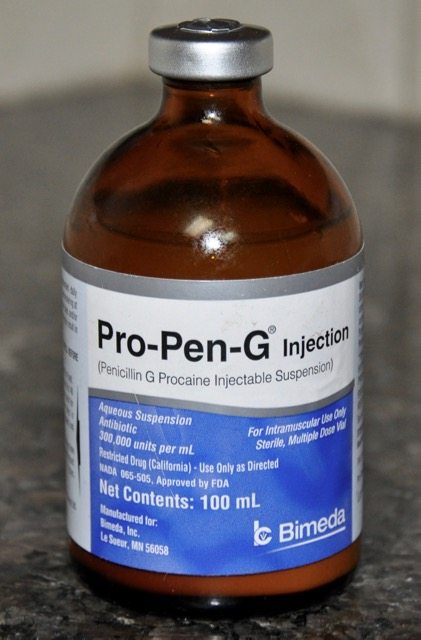
Penicillin
Oxytocin – helps with contractions if the doe has not passed afterbirth (IM injection)
Calcium Gluconate – to treat milk fever
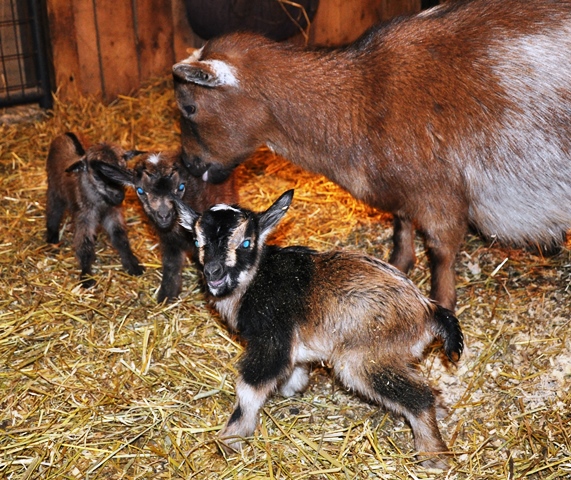
Ruby’s (2015) Newborn Kids
Propylene glycol – to treat ketosis
Uterus Bolus (Teramycin)
Teat dip – to prevent mastitis when milking
Supplies for Newborn Kids/Ailments
Pritchard Valve Nipple – for bottle feeding, giving colostrum
20 oz. pop bottle – attach to Pritchard for bottle feeding kids
Colostrum – have some frozen on hand for emergencies (from a CAE/Johnes free doe). The freshening doe produces this in the first 24 hours, but we keep a backup supply of frozen colostrum just in case – the kids need to get this within the first few hours
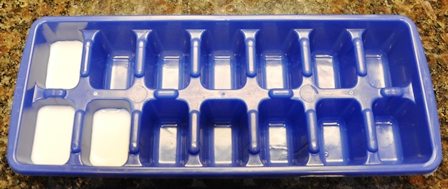
Colostrum Frozen In Ice Cube Trays
Kid Milk Replacer – 26% Protein
Tubing syringe kit (stomach tube & 60 cc dosing syringe) – for tube feeding a weak kid
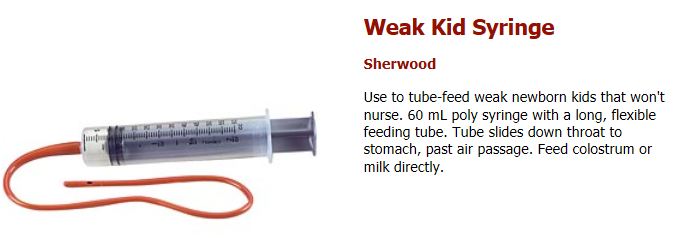
Nutri-Drench – this is used when tube feeding a weak kid to give it energy
50% Dextrose or glucose solution – to treat weak kids, dilute to 20%
Heat Lamp – to keep kids warm during cold weather. These are often responsible for barn fires so be sure to use sturdy lamps make for this purpose like those shown here.
Heat Pads – to warm hypothermic kids
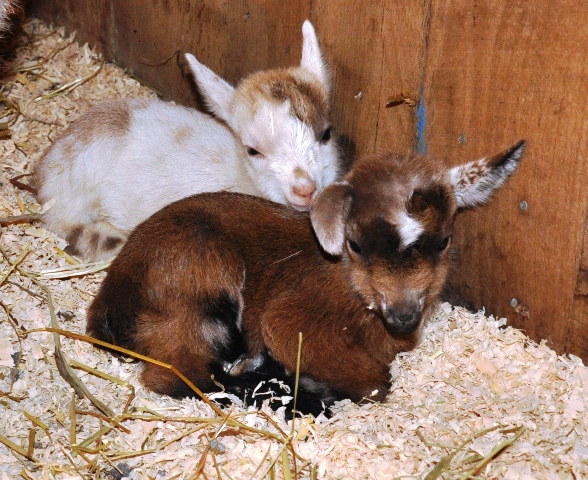
Newborn Kids
Kaopectate or Pepto-Bismol – to treat mild diarrhea
Electrolytes – to treat mild dehydration
Baking Soda – to treat acidosis, floppy kid
Scale for Weighing Newborn Kids – record kid weights at birth for record-keeping
Health Supplies
CD/T Vaccine – to prevent tetanus and enterotoxaemia. We give all pregnant does their yearly CD/T vaccination about 4 – 6 weeks before they’re due to freshen. This passes immunity to the kids until they’re old enough for their own vaccination and booster.
BoSe Injection – to prevent selenium deficiencies and white muscle disease. This is an Rx drug that needs to be prescribed by your vet and is also used to perk up kids that are weak at birth. Some breeders routinely administer this to all kids at birth.
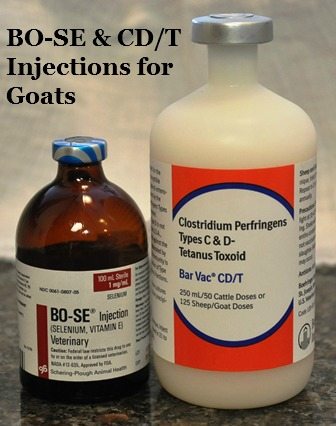
Bo-Se & CD/T Injectables
3 cc plastic disposable syringes – for administering CD/T, BoSe, etc.
¾” – 1” long, 20 gauge needles – for administering CD/T, BoSe, etc.
Epinephrine – you should have on hand any time you’re giving injections in case a goat goes into anaphylactic shock. If that happens you won’t have time to get the epinephrine so have it on hand when giving injections.
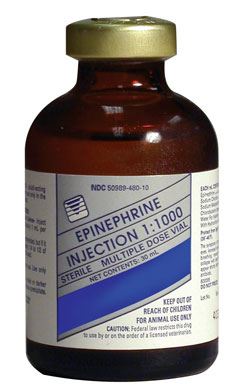
Epinephrine
Dewormer – treat adult does approximately one week prior to kidding
Probiotics – general health, administered orally

Probios
There are probably many other things that could be added to this list, but this is a good start. I have to say, it gets easier every year to get ready, at first there were a lot of confusing things to have on hand (so don’t get discouraged).
Of Goats and Greens says
Looks like a good list! At some point I hope to graduate to goats and sheep, and hope to kid the former. Marking this for reference!
Erin says
Lesa, in what cases do you use the terramycin uterine boluses? Also, do you use human heating pads, or those made for animals like whelping pads? Thanks.